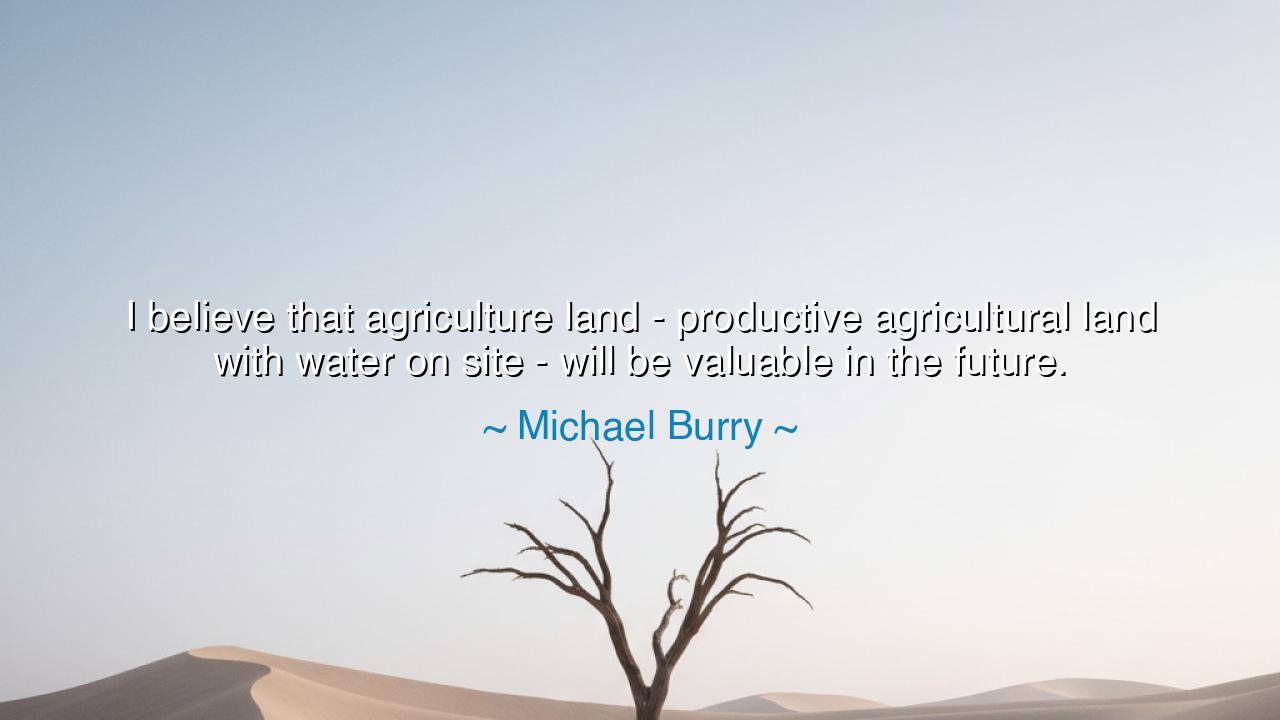
I believe that agriculture land - productive agricultural land
I believe that agriculture land - productive agricultural land with water on site - will be valuable in the future.






"I believe that agriculture land—productive agricultural land with water on site—will be valuable in the future." These words from Michael Burry carry a profound truth that speaks to the eternal relationship between humankind and the land upon which we depend. Burry’s insight reflects an understanding that, in times of uncertainty and change, it is the foundations of life—land, water, and the ability to grow food—that will continue to hold immense value. In this modern age of technology and innovation, we often overlook the ancient wisdom that reminds us that everything we need to survive ultimately comes from the earth.
In ancient civilizations, the land was seen not merely as a possession but as a sacred trust. The Sumerians, who created one of the earliest known forms of writing, also developed sophisticated irrigation systems that allowed them to harness the water from the rivers to grow their crops. Their success as a civilization depended on their ability to balance the use of the land and water, understanding that productive land was the cornerstone of stability and prosperity. Similarly, the Egyptians, along the banks of the Nile, revered the fertile soil, knowing that it was through the annual floods of the river that their agricultural wealth would be ensured. They built temples to honor the gods of the river, understanding the interdependence between land, water, and life.
Burry’s insight taps into this timeless truth. As the world changes—be it through climate change, population growth, or economic instability—the basic resources required to sustain life, such as food, water, and energy, will grow more precious. Agricultural land, particularly land that is productive and has water access, will become increasingly valuable as populations continue to rise and natural resources become scarcer. This truth is not a new one, but one that our ancestors understood deeply, as they worked the land and sought to maintain a delicate balance between human needs and the bounty of the earth.
In the modern world, we see the echoes of this ancient wisdom in the rise of sustainable farming practices and the recognition of the importance of water conservation. Warren Buffett, another influential figure, once remarked that "if you’re buying farmland, you’re buying something that will hold value." This recognition of the long-term value of agricultural resources aligns with Burry’s perspective. While we may live in an age of digital currencies and technological advancements, the soil beneath our feet remains the most fundamental asset for human survival.
Consider the example of the Dust Bowl in the 1930s—a period in which poor land management, coupled with drought, led to the collapse of agricultural systems across the United States. This tragedy was a stark reminder of how fragile our relationship with the land can be, and how deeply intertwined our survival is with the health of the earth. The Dust Bowl forced a reckoning with the reality that land is not something to be exploited recklessly, but a resource that must be cared for, respected, and nurtured for the generations to come.
The lesson from Burry’s words is clear: sustainability and stewardship of the land will be critical in shaping the future. Just as the ancients revered the earth and understood the necessity of maintaining the delicate balance between land and water, we too must focus on preserving and cultivating the resources that will nourish future generations. It is not enough to simply profit from the land today; we must ensure its health, so that it continues to provide for those who come after us. The future, as Burry suggests, will be shaped by the ability to protect and invest in the land that sustains us.
In practical terms, we can take action today by focusing on sustainable practices—whether it is in our gardens, farms, or in the ways we consume and manage resources. Every step we take to conserve water, to protect arable land, and to support sustainable agriculture is an investment in our future. Just as the ancient civilizations thrived by understanding the value of fertile land, so too must we learn to appreciate and preserve the natural resources that are critical to our survival. Land and water, when treated with respect and care, can sustain humanity for millennia to come.
Ultimately, Burry’s words remind us that true wealth lies not in the fleeting treasures of the moment, but in the enduring resources that will sustain future generations. The soil beneath our feet and the water that nourishes it are the cornerstones upon which all life is built. If we honor these resources, just as our ancestors did, we can ensure that our future remains rich and full, grounded in the same natural rhythms that have sustained humanity throughout history. Sustainability is not just a modern trend, but a timeless wisdom that must guide us in the generations ahead.






AAdministratorAdministrator
Welcome, honored guests. Please leave a comment, we will respond soon